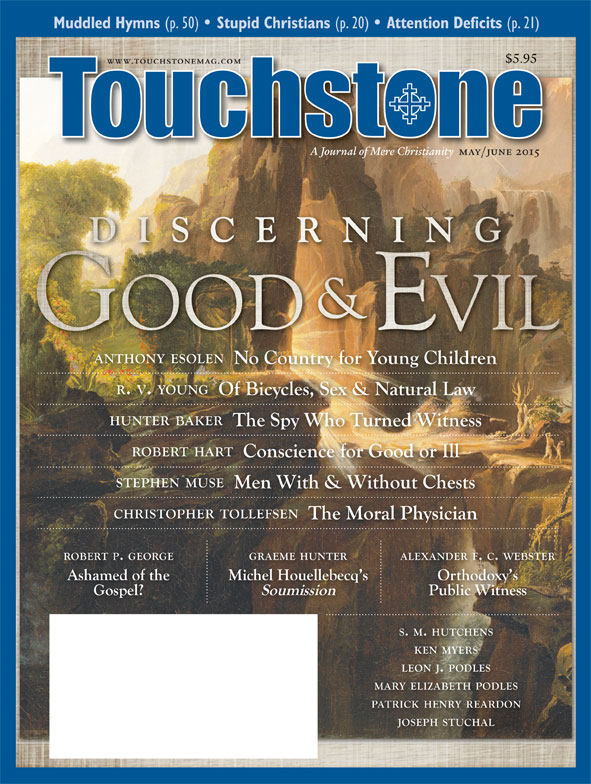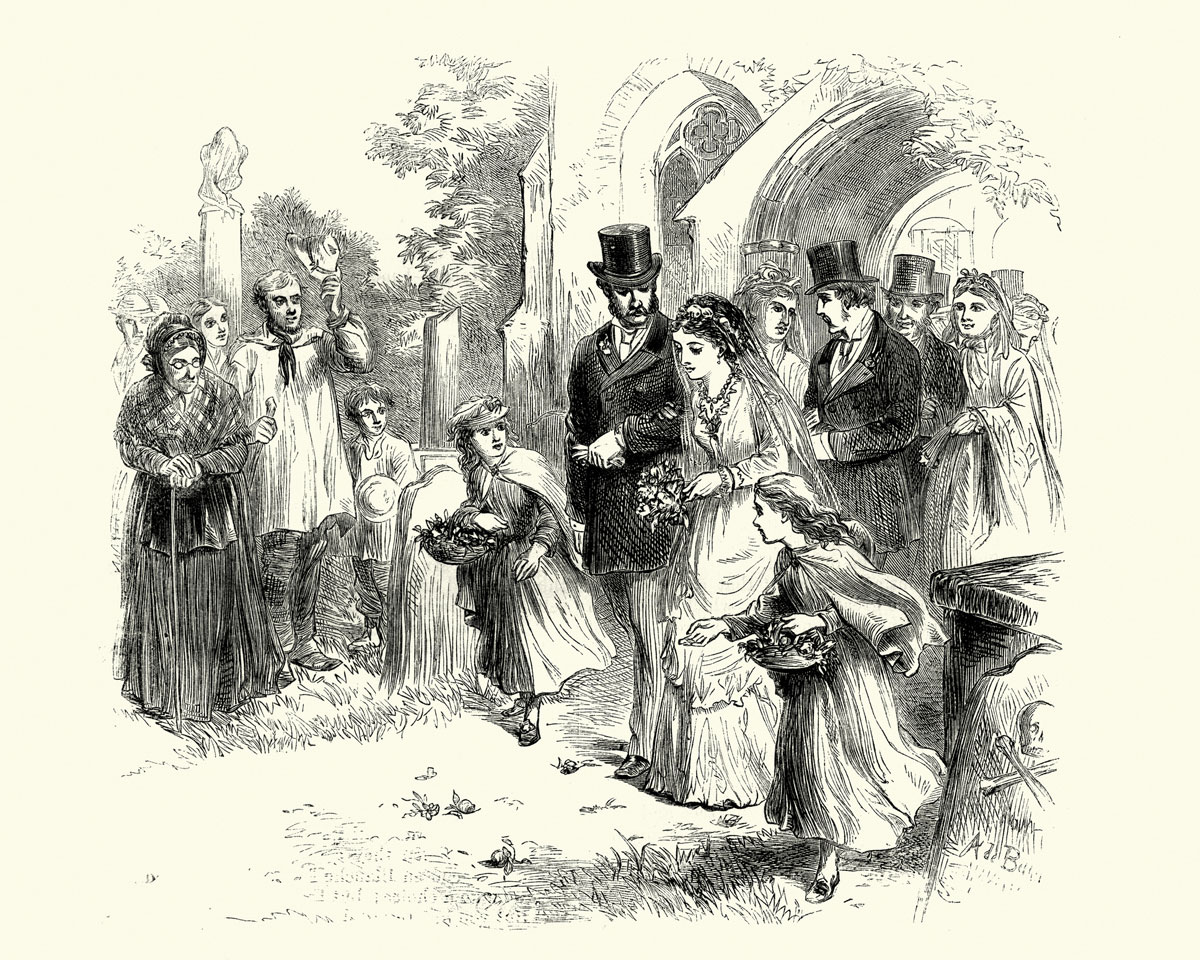Feature
Of Bicycles, Sex, & Natural Law
Describing Human Ends & Our Limitations Is Neither Futile Nor Unloving
Imagine that it is your birthday and you have just unexpectedly received a large pasteboard carton. You open it and find two large metal wheels with wire spokes rimmed by narrow rubber tubes, a tubular metal frame with a chain and two rotating rectangular appendages, a stainless steel object that somewhat resembles the horns of a stag, and several other pieces. Suppose you have seen others riding bicycles, but only at a distance, and you have never mounted one yourself. It takes a few minutes, but you figure out that what you have is a disassembled bicycle.
Now, having watched those others riding bicycles, it has occurred to you that cycling is probably fun as well as a faster means of transportation than walking. You set about assembling the contents of your package, eagerly anticipating the joy of cycling. You may approach this task hesitantly and make a few false starts. Nevertheless, fairly quickly you figure out that the various parts can only fit together in a certain way if you are to have a functioning bicycle.
Learning to get on, work the pedals, steer the device, and keep your balance may prove even more difficult than putting the bicycle together. Moreover, during the learning process you may fall a good deal and suffer some bruises and abrasions—to your ego as well as to your body. It is also necessary to learn how to interact safely and courteously with pedestrians and other cyclists and how to avoid being run down by cars. Still, once you have mastered the necessary skills, mental as well as physical, you find cycling an efficient, pleasurable, and generally satisfying means of transportation.
While it is true that you may be riding your bicycle mainly for pleasure or for healthful exercise, it is nonetheless undeniable that its purpose, its end, its nature is to be a means of transportation—a way of getting from one place to another. Its other benefits are ancillary.

To be sure, a "transgressive" contemporary artist may treat the bicycle as a "found object" and display it in a gallery. Along the trail where I do much of my own cycling, someone has placed a rusty old bike on top of an adjacent fence, and I have seen bicycle parts mingled with parts of garden implements, carpenters' tools, and the like to contrive rustic "sculptures" in gardens and parks. But the impact of these constructions—their wit, as it were—results from seeing the pieces of a bicycle and other such objects diverted from their usual or natural purposes to devise a kind of jocular, mock artwork. No reasonable person has a moment's doubt about the primary nature and purpose of a bicycle.
An Analogy
But, you may ask, what does this have to do with sex? Although sex and bicycles have little in common, there is an important analogy to be drawn. Like a bicycle, the sexual faculty of organic life has a very specific nature and purpose; hence, students of the biological sciences refer to the reproductive system. Among lower creatures that reproduce sexually, nothing seems to be going on except reproduction: it is improbable that salmon derive much pleasure from spawning, or that fruit trees establish interpersonal relationships from the transport of pollen from male to female specimens. Among more complicated and social creatures, those that tend their young or even mate for life, sexual relationships are, doubtless, correspondingly complicated and social.
But only among men and women does sexual reproduction become procreation, which involves (ideally) the formation of deep and permanent personal and spiritual intimacy between spouses and between them and their offspring, whom the parents not only nurture but also educate and cherish into adulthood. Even so, at its primitive core, the nature of sex is to provide new members of the species, just as the fundamental nature of a bicycle is to move the rider from one place to another.
Still, like the bicycle, which can furnish exercise and recreation, although not without hazard, so, too, sex offers an array of pleasures, comforts, and joys, although not without the possibility of heartbreak. But these additional benefits and risks do not alter the basic nature of either reality. Bicycles would not exist without the purpose of transportation, and without the purpose of procreation there would be no sexual faculty in living things.
Natural Law & the Moral Sense
At this point the analogy between bicycles and sex breaks down. The former is a mere human artifact; there is no necessary moral implication to violating its nature. Although BMX bicycle stunts are not to my taste as a spectator sport, there is no cause to wax indignant over a young man doing somersaults on two wheels; and I am neither much pleased nor much troubled by the deployment of bicycle parts as quirky garden adornments. A man may be vexed when his wife uses his best screwdriver to open a can of paint, but there is no moral issue involved in the perversion of a mechanical implement.
Men and women, to the contrary, are rational creatures, made in the image and likeness of God. Their nature is sacred and must not be violated. This is the simplest understanding of natural law as it affects the moral sense of ordinary men and women, who are not involved in the intricacies of academic controversy.
When we consider the basic realities of our everyday existence—and the sexual differentiation between men and women certainly counts among them—we grasp immediately and intuitively their nature and purpose and their implications for our lives. We may all be puzzled by moral dilemmas arising out of unusual or extreme circumstances, but even ordinary men and women, who have spent little time or energy brooding over moral philosophy, know that theft, murder, and fraud are wrong. And they also have a sound if elementary sense of what sex is and of what would be its use and abuse.
Abandonment by Conservatives
By now you may be wondering impatiently why I have gone to such lengths and invoked a stilted analogy to make a point that seems so obvious. But of course we all know perfectly well that this obvious point about our awareness of human nature and its demands—this truism—no longer appears to be obviously true to many powerful individuals and organizations. Most of our government officials in executive branches, legislatures, the judiciary, and various bureaucracies are unwilling or unable to acknowledge that just as a bicycle is essentially a means of transportation, so sex is naturally the means of human procreation, based on and determined by the complementary distinction between men and women. Among our academic, media, and entertainment elites, the idea that everyone has an inherent sexual nature marked by necessary restraints and limitations is almost universally deprecated and despised.
More worrisome still, the abandonment of natural law—of the understanding that the moral realities of our lives are largely determined by our specific human nature—has spread beyond the confines of progressive politics. Already in January 2011, William Kristol, editor of the ostensibly conservative Weekly Standard, chided "conservatives" and members of "the professional right" for "hyperventilating" about the repeal of the "Don't Ask, Don't Tell" policy, so that "gays" might serve "openly" in the military.
"Our fine servicemen and women," Mr. Kristol opined, "won't quit, they won't whine, they won't fret, and they won't cause a scene" over such an apparently trivial matter as being involved in organizations that condone, indeed celebrate, sodomy. Besides, as a subsequent editorial in the same issue observed, the policy change should have prompted Ivy League universities and other elite institutions to readmit to their campuses ROTC programs, which had been excluded because of their purported policy of "discrimination." What a perfectly sensible compromise, with something for everyone!
A Question of Persuasiveness
A neo-conservative shrug of the shoulders about so frivolous a worry as "just another step in the decline of the West" is hardly surprising. More troubling is the view of the Eastern Orthodox theologian, David Bentley Hart, eminent foe of the "new atheists" and the scientism generally regnant among our cultural elite. Writing in First Things in March 2013, he maintained that contemporary invocations of natural law as a rhetorical strategy in moral discourse must inevitably fail, because "in an age that has been shaped by a mechanistic understanding of the physical world, a neo-Darwinian view of life, and a voluntarist understanding of the self, nature's 'laws' must appear to be anything but moral." Besides, even if one can perceive an order and purpose in nature, modern men and women will be swayed by the eighteenth-century skepticism of David Hume, who argued that an "ought" cannot logically be derived from an "is."
Two issues later, in the wake of a predictable torrent of dismay in the magazine's "letters to the editor" section, Dr. Hart took up the issue again, defending himself against misunderstandings (e.g., he is not himself a follower of Hume) and against the "two-tier Thomism" of Edward Feser, and insisting that natural law theorizing is an inadequate form of moral reasoning, because there is no clear line between the natural and supernatural and hence no way that philosophy, using natural reason, can "achieve definitive moral demonstrations": "There is no single master discourse here, for the good can be known, only by being seen, before and beyond all words."
Now I shan't enter into an argument about the intricacies of natural law and the debates among natural law philosophers over whose version is preferable. I am curious, however, about what might be an effective apologia for traditional morality in view of the presumptive failure of natural-law reasoning to be persuasive. Here is what Dr. Hart offers at the conclusion of his second commentary on the subject:
Certain fundamental moral truths . . . may necessarily remain unintelligible to someone incapable of appreciating Bach's fifth Unaccompanied Cello Suite. For some it may seem an outrageous notion that, rather than a collection of purportedly incontrovertible proofs, the correct rhetoric of moral truth consists in a richer but more unmasterable appeal to the full range of human capacities and senses, physical and spiritual. I, however, see it as rather glorious: a confirmation that our whole being, in all its dimensions, is a single gracious vocation out of nonexistence to the station of created gods.
Let us proceed on the surmise that Dr. Hart's grand peroration means that it is incumbent upon upholders of traditional morality to be far more cultivated, imaginative, and interesting.
First, there is the is/ought problem: Does this problem, in fact, fatally undermine the rudimentary grasp of natural law among men and women who would be hard-pressed to identify an instrument as a cello if they heard one playing "Turkey in the Straw"? C. S. Lewis did not think so. In The Abolition of Man, he not only concedes but even urges the proposition that an ought cannot be derived from an is. At least, not at first. The basic moral norms, accepted by all men and women in virtually all societies and civilizations must first be recognized and acknowledged intuitively, or they will not be known at all. Natural law is not a means of proving the basic principles of right and wrong, good and evil, but rather a way of explaining what most of us, in fact, have already realized.
Precisely in order to avoid the kind of hair-splitting about the nuances of natural law in which Dr. Hart indulges, Lewis called the self-evident principles of natural law the Tao—the "Way" in Asian teaching. "You must not hold a pistol to the head of the Tao," Lewis writes. "Nor must we postpone obedience to a precept until its credentials have been examined." Similarly, you must not demand that upholders of the moral law be perfect in their practice and winsomely engaging in their demeanor in order to grant the traditional teaching credibility.
Whose Logic Is Twisted?
It is not as if enemies of natural law have offered a dazzlingly cogent alternative. Consider a fairly typical example of the current version of the "new morality" furnished by Daniel Ruth, an editorialist for the Tampa Bay Times. Inveighing against a defense of Florida's refusal to acknowledge "same-sex marriage" by the state's attorney general, Pam Bondi, who maintains "society's legitimate interest in increasing the likelihood that children will be born to and raised by mothers and fathers who produced them in stable and enduring family units," Mr. Ruth's resounding rejoinder is, "That all sounds very Walton family until you realize that the most recent U.S. Census data lists Florida as ninth in the nation for its divorce rate."
It is ironic that the headline to the editorial refers to "Bondi's Twisted Logic," and the text to her "tortured logic." Mr. Ruth's rebuttal is analogous to the argument that, since licensed physicians often make mistakes in operations, anyone who wishes to should be allowed to perform brain surgery. Moreover, he has committed a classic textbook error in—logic. The fallacy of the undistributed middle term may be illustrated thus: Donkeys have teeth. Socrates has teeth. Therefore Socrates is a donkey. Mr. Ruth's argument is in principle the same: "Gay" marriages do not provide a stable home for children with their biological parents. But, because of divorce, marriages between a man and a woman [sometimes?] don't provide a stable home for children. Therefore there is no difference between "straight" and "gay" marriages.
It hardly requires a logician to perceive the vacuity of Mr. Ruth's argument—its "twisted logic"—when it is reduced to schematic form. But, you may say, this is somebody ranting in a local rag. It hardly counts. Let us then consider a more intellectually sophisticated gambit in opposition to traditional morals. Here is Paul Griffiths, in a review of Darling: A Spiritual Autobiography by Richard Rodriquez, a self-identified "gay Catholic," published in First Things in April 2014:
On homosexuality, and homosexual acts . . . I think Rodriguez much closer to being right than not. Insofar as such acts are motivated by and evoke love, they are good and to be loved; insofar as they do not, not. In this, they are no different from heterosexual acts.
He goes on to say,
But if you think, as Rodriguez does, and I do, and all Catholics should, that we live in a devastated world in which no sexual acts are undamaged, free from the taint of sin and death and the concomitant need for lament, then the fact that homosexual acts have their own characteristic disorder is no ground for blindness to the good they enshrine.
The local bishop will perhaps wonder why Professor Griffiths, who holds the Warren Chair of Catholic Theology at Duke Divinity School, equates sodomy, which the Catechism of the Catholic Church calls "inherently disordered," with conjugal acts that are essential to the sacrament of holy matrimony. I am content, however, to call your attention to the fact that the Professor of Catholic Theology at Duke Divinity School deploys the same faulty logic as the editorialist for the Tampa Bay Times: "Homosexuals" are sinners. Married men and women are sinners. Therefore married men and women are (no different from) homosexuals.
Haters of Logos
Mr. Rodriguez and Professor Griffiths are likely the kind of men capable "of appreciating Bach's fifth Unaccompanied Cello Suite." Aesthetic awareness is clearly no guarantee of moral clarity. Natural law arguments, David Bentley Hart to the contrary notwithstanding, do not fail to convince dissenters against traditional morality because the dissenters have devised or encountered more effective arguments. They refuse to be convinced because they are what Socrates in the Phaedo calls misologists—haters of argument. Socrates' point is that we really cannot do without argument, without logos—or in Hamlet's phrase, "discourse of reason."
We should also remember that a hater of logos, or human reason, is inevitably going to reject the term with a capital letter, Logos, the Word of God, the Second Person of the Holy Trinity. For our grasp of the rudimentary precepts of natural law, before we have a theory about it, is simply our awareness, in keeping with our individual capacity, of the moral meaning inherent in our humanity. As St. Thomas points out, natural law is "this participation in the rational creature of the eternal law" (Summa Theologiae 1–2.91.2).
Dr. Hart counters by asserting, "Today we generally eschew cannibalism, slavery, polygamy, and wars of conquest because of a millennial process of social evolution, the gradual universalization of certain moral beliefs that entered human experience in the form not of natural intuitions but of historical events."
But the only "historical events" that effected this change were the development of Western natural-law philosophy (deriving mainly from Plato and Aristotle through Cicero) as enhanced by incorporation into two millennia of Christian doctrinal development, which succeeded in consolidating and ordering those shadowy intimations of morality, available in varying degrees to all human beings. A moral growth that developed only in the Christian West and spread thence throughout the world is hardly the result of a random "social evolution."
What is more, our society is rapidly failing to "eschew" a great many moral outrages. It is hard to imagine that polygamy will long be prohibited in a society that enforces the acceptance of "gay marriage" and the recognition of 57—or is it 58?—varieties of "gender." Similarly, it is hard to see a morally significant difference between the harvesting of fetal stem cells (with cloning of human beings for exploitation to follow?) and adult organs, and cannibalism. Finally, one might reasonably argue that slavery and wars of conquest have never departed from the modern world, and the advocates and agents of all these practices are drawn largely from among those who are not persuaded by natural-law reasoning.
Dismantling Moral Foundations
The adherents to "a mechanistic understanding of the physical world, a neo-Darwinian view of life, and a -voluntarist understanding of the self" have not provided an alternative basis for the "universalization of certain moral beliefs"; rather, they are rapidly dismantling the foundations for any moral belief at all. What is a "voluntarist understanding of the self," after all, but an assertion of naked demand to be and to do whatever the will (voluntas) desires? Or in the words of the contemporary moral philosopher, Woody Allen, "The heart wants what the heart wants."
This devolution is being carried out not according to reason but in contradiction to it. Invoking "a woman's right to choose" and calling a fetus "potential life" are rationalizations for abortion, not rational arguments. Similarly, our society's current preoccupation with "marriage equality" and "gender diversity" are examples not of an alternative form of moral reasoning, but rather of the abandonment of reason.
An Associated Press story, reprinted in the Tampa Bay Times (May 31, 2014), offers a final example of this moral disintegration: "Medicare can no longer automatically deny coverage requests for sex reassignment surgeries, a federal board ruled Friday in a groundbreaking decision that recognizes the procedures are medically necessary for people who don't identify with their biological sex." The "patient" who has successfully demanded this "medically necessary" surgery is a "74-year-old transgender Army veteran."
In other words, he—the article uses "she"—is no longer content to dress up and play at being a woman; he is insisting on surgical mutilation of his genitals and a regimen of female hormones to make his delusions somewhat more plausible. "When people ask if I am too old," he complains, "it feels like they are implying that it's a 'waste of money' to operate at my age. But I could have an active life ahead of me for another 20 years. And I want to spend those years in congruence and not distress." Such is the result of a "voluntarist understanding of the self."
According to my information, some individuals long deeply, apparently with erotic intensity, to have limbs amputated (a condition called apotemnophilia). Is there any reason for Medicare not to pay for this procedure? There is no difference in essence between this and a "sex-change" operation. In each instance there is a perverted desire to mutilate some part of a healthy body and thereby nullify its normal function. Neither procedure is in any sense "medically necessary," just as abortion is rarely a medical necessity: no disease is cured; no physical abnormality is corrected.
Ah, but there's the rub! Once the concept of human nature is jettisoned, then there is no basis for determining what is normal—a situation that would seem to make the practice of medicine problematic. Hence we have solemn denunciations of "heteronormativity."
A Recognition of Reality
Natural law has not failed because it is an inadequate understanding of the realities of human life. Insofar as it has "failed," this is the result of rebellion against the limited creaturely status of human beings on the part of the contemporary cultural elite, provoked by many factors, including, no doubt, a large dose of technological hubris. But there is no alternative to something like natural law, because, whether formulated well or poorly, it is simply a recognition of the reality of what men and women are and of their actual situation in this world. To the extent that the mechanistic, Darwinian understanding of the world is incompatible with natural law, it is both wrong and intrinsically immoral. There is no substitute for natural-law morality: in its basic form, it's the only game in town.
Some readers may regard an assertion of natural moral principles as unfeeling, heartless, cruel. It is, to the contrary, an expression of Christian love, or charity. St. Thomas Aquinas defines charity as willing the good of another. To shrug our shoulders and look the other way at the prospect of another man maiming himself for the sake of an erotic fantasy, because we don't wish "to hurt his feelings," is at best sentimentality, at worst a neglect of his human dignity. Genuine love is not sentimentality; it is not a vague emotion. Condoning another man's irrational, self-destructive behavior is certainly not willing his good.
Decent, morally serious men and women, and Christians above all, must resist normalization of the abnormal with all their resources. In view of the moral and cultural depravity of contemporary society, I concede that one can hardly be optimistic about our prospects for success; nevertheless, it is our duty in charity to try. And I should add that my experience with university students in recent years suggests that we shall have a better chance of awakening in them an awareness of the basic principles of natural law than an appreciation of Bach's fifth Suite for Unaccompanied Cello. •
R. V. Young is Professor of English Emeritus at North Carolina State University, a former editor of Modern Age: A Quarterly Review, and the author of Shakespeare and the Idea of Western Civilization (Catholic University of America Press, 2022). He and his wife are parishioners at St. Ignatius of Antioch Church in Tarpon Springs, Florida. They have five grown children, fifteen grandchildren, and three great-grandchildren. He is a senior editor of Touchstone.
subscription options
Order
Print/Online Subscription

Get six issues (one year) of Touchstone PLUS full online access including pdf downloads for only $39.95. That's only $3.34 per month!
Order
Online Only
Subscription

Get a one-year full-access subscription to the Touchstone online archives for only $19.95. That's only $1.66 per month!
bulk subscriptions
Order Touchstone subscriptions in bulk and save $10 per sub! Each subscription includes 6 issues of Touchstone plus full online access to touchstonemag.com—including archives, videos, and pdf downloads of recent issues for only $29.95 each! Great for churches or study groups.
Transactions will be processed on a secure server.
more on sex from the online archives
more from the online archives
calling all readers
Please Donate
"There are magazines worth reading but few worth saving . . . Touchstone is just such a magazine."
—Alice von Hildebrand
"Here we do not concede one square millimeter of territory to falsehood, folly, contemporary sentimentality, or fashion. We speak the truth, and let God be our judge. . . . Touchstone is the one committedly Christian conservative journal."
—Anthony Esolen, Touchstone senior editor














